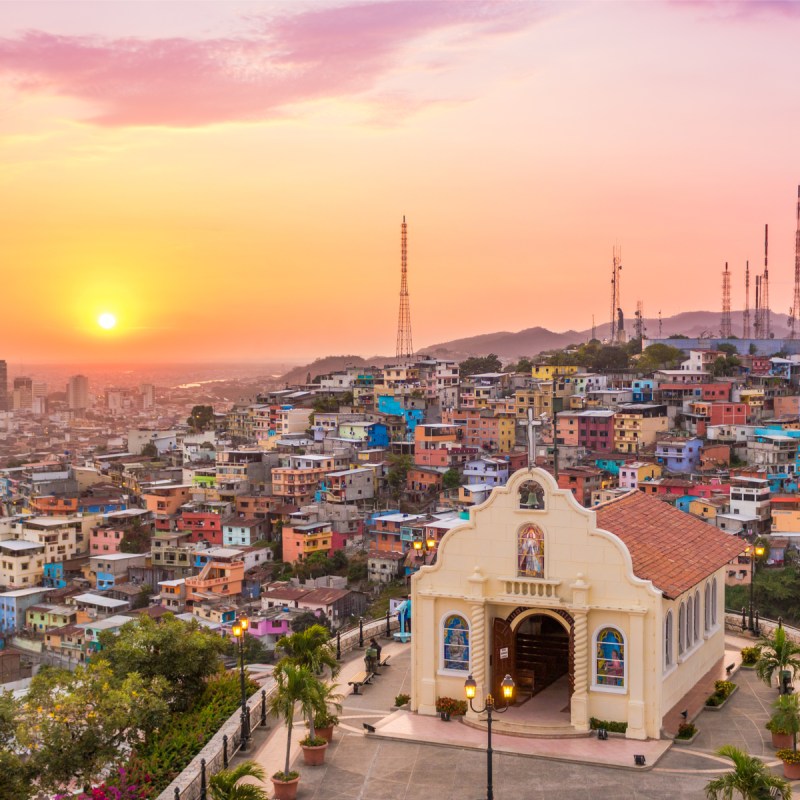
With a gorgeous climate, low cost of living, and a slower pace of life, Ecuador has much to offer retirees. In fact, the country is often cited as one of the best places on earth to retire. But while Ecuador may indeed be a retirement paradise or close to it, there are still many practical matters for would-be expats to consider, healthcare first among them. If you’re contemplating a move abroad, here are some considerations to keep in mind about Ecuador’s healthcare system.
Videos by TravelAwaits

1. Rankings Are Inconsistent
Lists, charts, and rankings rarely tell the whole story of a country’s healthcare system and this seems especially true of Ecuador. For instance, Bloomberg ranked Ecuador as having the 47th most efficient healthcare system among advanced economies, putting it above the United States, Brazil, and Cuba. On the other hand, the World Health Organization’s ranking lists Ecuador as 111th out of 191 countries — not exactly an outstanding result. What can expats, retirees, and travelers take from these mixed results? Essentially, Ecuador’s healthcare system has a number of strong points and has improved steadily over the last few decades but there is still significant room for growth. If you hear other expats rave about the state-of-the-art care they receive, know that they’re most certainly talking about private healthcare services, which aren’t taken into account in these kinds of rankings.
2. A Mix Of Private And Public Care Is Used
As mentioned above, Ecuador’s healthcare system relies on a mix of public and private services. Most expats opt for care in private clinics and hospitals, where wait times are shorter, the setting is more private, and the surroundings are more comfortable. Many Ecuadorian doctors have trained in the United States, Canada, and Europe and many speak English.

3. There’s A Big Urban/Rural Gap
Like so many countries, Ecuador has a significant gap in healthcare services between urban and rural communities. 66 percent of the population in Ecuador lives in and around cities like Cuenca, Quito, and Guayaquil. Not surprisingly, these are the cities where the majority of doctors and medical facilities are located. The country averages 1.72 doctors per 1,000 people (by comparison, in the United States, it’s 5.5 doctors/1,000). As such, Ecuador is already struggling with personnel shortages. When combined with the fact that most physicians work out of urban areas, the result is that rural patients really lack substantial care.

4. Overall, Costs Are Really Low
If you’ve ever paid for healthcare costs directly in the United States, Canada, or Europe, you know how expensive some tests and treatments can be. Compared to nearly every other country in the world, healthcare costs in Ecuador are extraordinarily affordable. A visit to a general practitioner costs $20 to $40, while a specialist visit usually costs anywhere from $40 to $100. Major surgeries can range from being less than half the cost of similar procedures in the United States to as little as about 10 percent of the comparable American cost.
5. … But Not That Low
If you’re used to living in a pricey city like New York or Los Angeles and your move to Ecuador corresponds with a radical change in lifestyle — perhaps you’re going to live off the grid and embrace a no-buy minimalist lifestyle — you can expect your monthly budget to plummet by the thousands. But most people don’t experience such an extreme change. You probably want some creature comforts at your new home, like housekeeping services or access to a pool. While seniors in Ecuador enjoy many discounts, expats also face many financial temptations, like travel or other splurges. And healthcare costs, even low ones, can quickly add up. If you need to bring a translator to appointments, if you need to travel into the city to see your doctor, or if you need to import medications from the United States, you might be surprised at how expensive this “cheap” destination can really be.

6. You Have To Call Ahead To See A Doctor
In order to have a doctor’s appointment, you need to make an appointment in advance by calling the national call center. General Practitioner visits are usually scheduled within a few days. Unless the doctor works out of a larger clinic, they often do all the work themselves (for instance, they’ll take your blood pressure. It won’t always be a nurse). In order to see a specialist, you must be referred by your GP.
However, not all doctor’s appointments take place in their clinic. Housecalls still exist in Ecuador! Granted, they’re less and less common but it’s still a possibility.
7. Foreigners Face Insurance Rules
In 2016-2017, Ecuador’s legislators passed new laws which made it mandatory for all citizens and residents with registered visas to carry some type of health insurance. Additionally, the legislation also dictates that foreigners living in Ecuador have to have some kind of health insurance. Enforcement is admittedly spotty. In theory, your insurance status should be checked upon entering the country but in reality, this isn’t always the case. However, if you’re trying to obtain a new residency visa or transfer an existing visa from an old passport to a new one, you can expect verification of your insurance status.
Private health insurance policies purchased from an Ecuadorian company (as opposed to an insurance agent in your home country) are often very affordable. Premiums are often under $100 a month and dependent children are often under $20 a month. Many policies are designed to pay 80 percent of doctor visits, 60 percent of medication costs, and 100 percent of hospitalization costs.

8. Buying Into Social Security Might Be Possible
Since 2014, foreign residents have had the option of “buying-in” to Ecuador’s national social security healthcare system (known as the Instituto Ecuatoriano de Seguridad Social, or IESS).
The public healthcare system covers all in-hospital care, outpatient care, extended care, home care, prescription drugs, dental care, and eye care. Depending on your healthcare needs, this could be quite a bargain for you — or possibly something you’ll never use. Some expats prefer to just pay for individual services as they’re needed, finding it more economical in the long run.
As a general rule, IESS coverage works out to 17.6 percent of your monthly income, and a spouse or other family members can be added for an additional 3.41 percent. Those who are self-employed can self-enroll in the system, while those who have traditional employment will be enrolled by their employer. However, those who are retired and 65 years or older are covered at the minimum premium, which is about $72 a month.
Expats must provide proof of income, as your income level determines your IESS insurance rate. If your Ecuadorian visa was based on your pension, that’s the income that will be used in the calculations. However, other visa holders will need to provide income documentation.

9. COVID-19 Changed The Ecuadorian Healthcare System
Ecuador has one of the most unique stories of any country when it comes to the COVID-19 pandemic. The country had 64 percent more deaths than expected (based on projects of what the typical death rate is per percentage of the infected population). In particular, the Indigenous population had 125 percent more deaths than projected. With medical, government, and social services overwhelmed, the situation was so dire that bodies were left on the streets, as no one would come to pick them up. Yet, from this tragic situation, there have been some significant changes to Ecuador’s public health mandates. Most ambitious of all was the 9/100 plan. The country set out to vaccinate 9 million people in 100 days. To do so, it took on a challenging amount of “vaccine diplomacy” work, securing supply through a number of countries and organizations. It did indeed meet its targets and it will be interesting to see how Ecuador’s new approach to public health outreach will change other services going forward.
- Read more about retirement on TraveAwaits, including healthcare:
- Retiring Abroad? 10 Things To Know About Healthcare In Portugal
- Retiring Abroad? 8 Things To Know About Healthcare In France
- 6 Things To Know About Healthcare In Mexico For Expat Retirees
